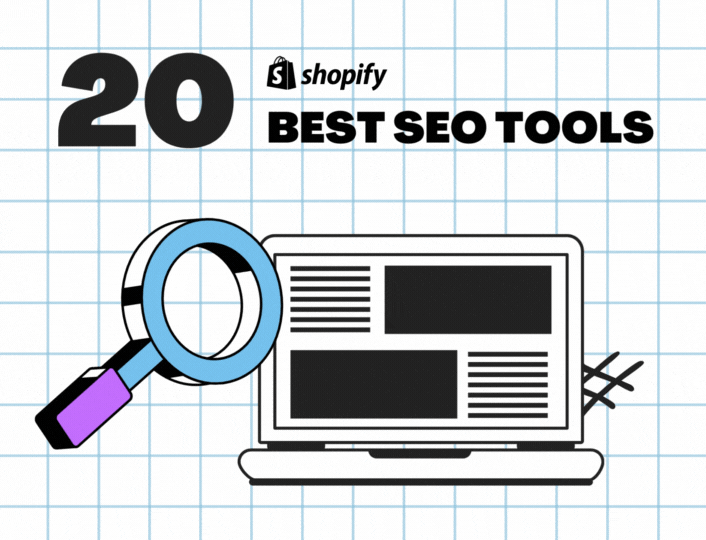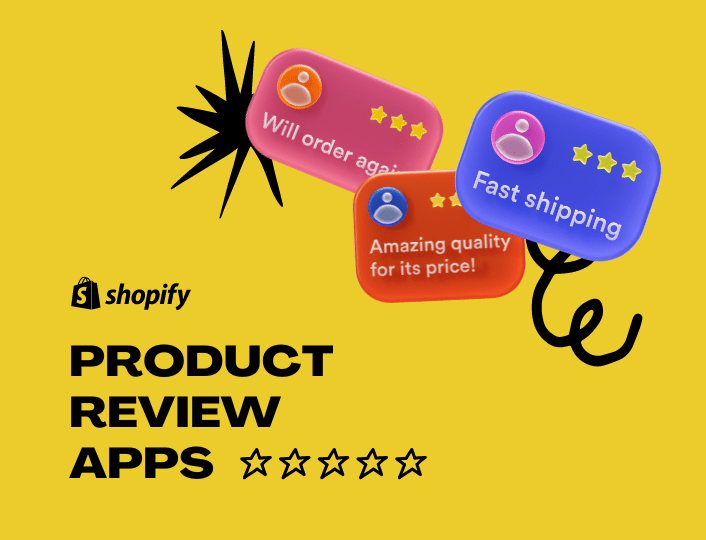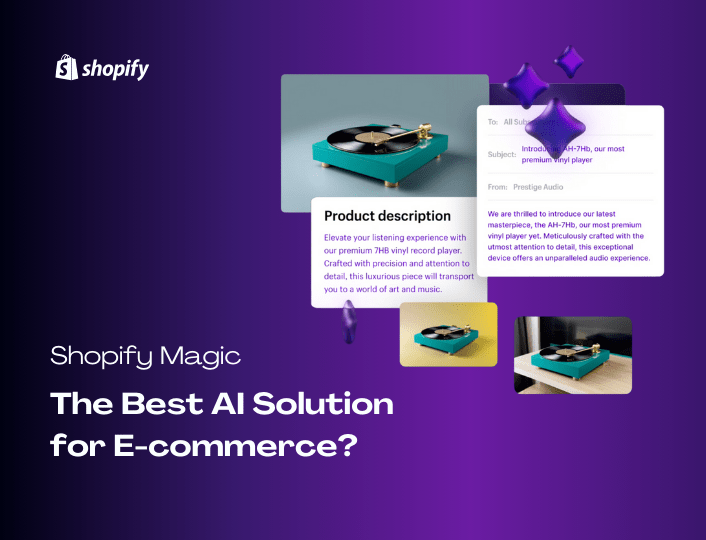Are you looking to sell your products or services online but can’t pick a platform? Are you torn between Shopify and Etsy but can’t make a choice? You have come to the right place.
Starting your journey as an e-commerce business owner can be daunting, especially when choosing a platform. And the truth is, the success of your e-commerce business hinges on your ability to pick the right platform.
Before you settle for any platform, you must understand the difference between a marketplace and an e-commerce site. In this article, we have chosen Shopify and Etsy (these are the two biggest e-commerce and marketplace platforms) to clear the difference.
Difference Between An Ecommerce Platform And A Marketplace?
An e-commerce platform gives you total control over your store. You can customize the look of your store, set your price, take inventory, and sell any product of your choice. Shopify is the perfect example of an e-commerce site.
A marketplace, on the other hand, is a multi-vendor website that allows retailers like you to connect with customers and sell your products. Unlike e-commerce platforms, marketplaces handle your inventory, overall store appearance, and your marketing needs. Etsy is an excellent example of a marketplace.
In all fairness, Shopify and Etsy are unique in different ways. In this article, we will go further into the differences between the two e-commerce solutions.
Shopify
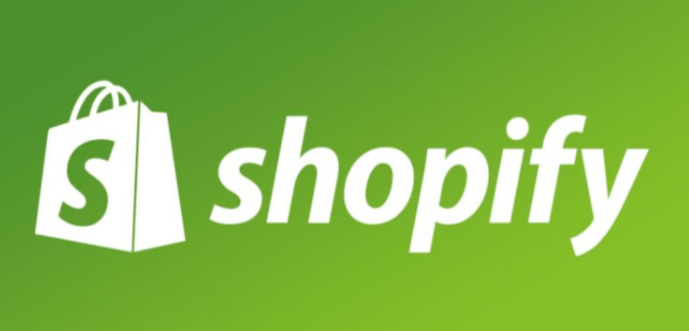

Shopify is one of the most common and widely used e-commerce sites. Shopify caters to the needs of businesses on different levels. The platform has almost everything you need to manage a successful business. Plus, they let you use third-party services with ease. And they are fully hosted, meaning you don’t have to pay extra for maintenance.
However, you will need to promote your store or business by yourself. You will need to run multiple ads through different means to drive traffic to your store. But as we stated before, Shopify has what you need to make it work.
How Does Shopify work?
There are many things you consider before setting up a functioning Shopify store. For example, domain names, customizations, security, price, customer support, and others. These are vital to your store.
Domain Name
Let’s begin with the domain name. A domain name is the most prominent thing about your business. A good domain name can attract more customers to your store and otherwise. If you don’t have a domain name yet, Shopify can help you generate a business name for your store.
Although there are several other Shopify Alternatives platforms where you can buy a domain name, you save money on transactional fees when you buy from Shopify.
Customization
After choosing a domain name, the next step will be customizing your store. Customization is one of Shopify’s strong suits. The platform gives you absolute control over your store, so you can give it a look and feel that suits you.
Shopify comes with hundreds of customizable themes.You can easily edit these themes using the drag-and-drop editor. Also, integrating them with your store is a hassle-free process.
Payment Method
Shopify has a built-in payment processor for people in specific regions across the globe. You can pay for services or receive payment for your business through these payment options. For people outside the regions covered by the in-built processors, Shopify allows you to integrate as many third-party payment processors as you need.
Security
One of the concerns of setting up an online business is security. As an online business owner, you should be sure that your client’s details are safe. Therefore, Shopify offers a free SSL certificate for every business on the platform.
If you don’t know what an SSL certificate is, here is the thing. An SSL certificate creates an encrypted route for sharing sensitive details such as credit card details on a server. That way, such information cannot be stolen by hackers.
Marketing
After designing your store website, what determines the success of your business? Sales! Making sales on Shopify will require driving traffic to your website, and marketing is the one sure way to achieve this feat.
Shopify has hundreds of marketing tools that will enable you to generate more leads on your store website. It has SEO and customer relationship management tools, blogging sections, affiliate marketing apps, and integration with Social media platforms. The Shopify app store has over 6,000 apps to cater to all your needs.
Analytics
Of course, you would like to know how well your business is doing and the impact of your marketing strategies. There is an analytic button on your Shopify dashboard. It gives you full details of your business performance.
Pricing
Shopify offers a 14-days free trial with no commitment for new users. Subsequently, it charges you a monthly fee to keep your business running. Other additional charges may apply.
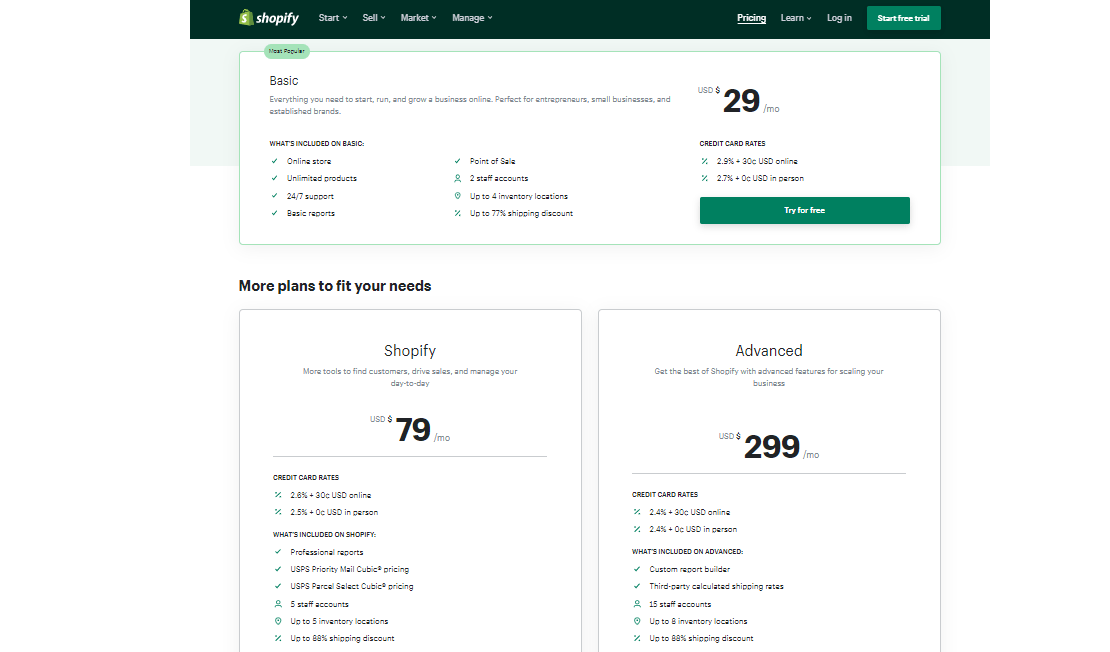

- Shopify Starter Plan: costs $5 per month, plus additional charges of 2.9% + $0.30 on every online credit card purchase. This plan allows you to sell your products through social media.
- Basic Shopify: costs $29 per month. The transactional charges on the starter plan also apply to this plan, plus 2.7% for in-person sales. You will pay 2% if you use a third-party payment processor. The Basic Shopify plan gives you access to other beneficial features such as discount codes, two employee accounts, abandoned cart recovery, Shopify POS app, multichannel selling, and more.
- Shopify: costs $79 per month. This plan retains all the Basic features with a slight change in transactional charges. You will pay 2.6% + $0.30 for online credit card transactions and 2.5% for in-person transactions. In addition to the Basic features, you will get up to 5 employee accounts, the POS feature, e-commerce automation, up to 88% shipping discount rates, and more.
- Advanced Shopify: costs $299 per month. This plan unlocks all of Shopify’s features while reducing your transactional fees to 2.4% + 30 cents for every online transaction.
- Shopify Plus: this plan is for businesses at the enterprise level that processes large sales per minute. Shopify charges you based on your needs and the number of sales you process.
Etsy
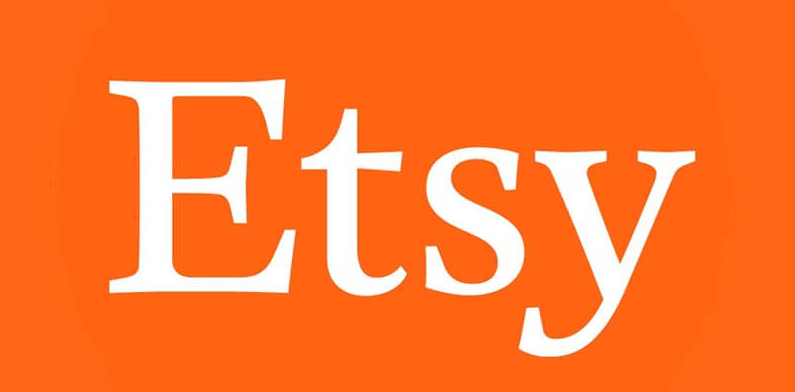

Etsy as a marketplace is the perfect platform for small businesses. It was initially created as a marketplace where artists and craftsmen sell their handmade items. So before you think about using Etsy, ask yourself if your customers are on the platform.
When it comes to selling items online, running a full-blown e-commerce store is not an easy task. Etsy does all the heavy lifting if you can’t afford the time and resources to run a stand-alone online store.
Etsy has a large customer base with over 81.9 million active buyers and has made a name for itself. So you don’t need to worry about marketing. This makes the perfect platform for a side hustle, but only if you sell original items.
How Does Etsy Work?
Unlike Shopify, setting up your store on Etsy is pretty fast. Once you sign up, you upload product images to your store, add descriptions, and that’s it. You are ready for business.
Domain name
Etsy provides a subdomain for you. But if you already have a domain name, you can redirect it to your Etsy store.
Customization
Etsy does not give you much freedom to customize your storefront. The best you can do is, upload quality product images, add a logo to your store, and describe your products as best as possible. But, there is nothing to worry about. Etsy does not slack when it comes to the general marketplace appearance.
Security
Etsy is no different from Shopify when it comes to security. They offer free SSL certificates to protect you and your customers against internet fraud.
Payment Method
Unlike Shopify, you can only use the in-house payment processor for your business transactions on Etsy. Third-party processors are not allowed. However, the in-house payment processor accommodates multiple payment options such as PayPal, credit and debit cards, Apple Pay, Google Pay, and ACH payments.
Marketing
Etsy already has a large customer base with over 89.1 million buyers, putting you at a marketing advantage. Since the platform is a marketplace, it is easier to market your products without going through a rigorous process. Customers can buy from you without knowing your store name.
However, instead of relying solely on Etsy’s large customer base, you can use the in-house marketing tools or third-party tools made for Etsy.
Analytics
Etsy gives you a detailed breakdown of your business performance and the key performance indicators (KPIs).
Pricing
Etsy runs mainly on transactional charges and commissions, although it recently introduced a monthly plan. There are main fees you will always have to pay.
- Listing fee: every item you list on Etsy will cost $0.20. Listing runs for four months or until the product is sold.
- Payment processing fee: Etsy charges you a payment processing fee of $0.25.
- Transaction fee: 6.5% for each time sold.
- The commission per sales: you will pay 3% as commission for sales you process.
- Etsy Plus: the plus plan costs $10 per month plus other standard fees. It gives you access to more advanced features such as flexibility with customization, advertising credits, email notification, cheaper cost of marketing, and more.
Shopify vs. Etsy: Here Are The Main Differences
1. Customization
Shopify allows you to build a standalone online and customize it as you like. Etsy, on the other hand, integrates sellers into its platform, so you can’t customize as much.
2. Integration
Integrating third-party tools on Etsy is limited to a few options, but it is not the same with Shopify. You can outsource as many tools as you need for an extra charge.
3. Marketing
Etsy is a good choice if you want to start a small business with limited resources. The platform invests heavily in marketing and has millions of active buyers. As for Shopify, you will need to promote your store by yourself with the help of several marketing tools of course.
4. Payment Method
Etsy users can only process transactions with the built-in payment processor. Whereas, Shopify allows you to integrate other payment processors outside of the ones it provides.
5. Pricing
Shopify runs on a monthly charge whether you make sales or not. Additional charges may apply for each transaction you process. But, Etsy only charges you when you make sales. Using Etsy may seem cheap at the beginning, but if your store records high sales you may spend more than you expected.
Conclusion
To sum it up, Shopify and Etsy serve different purposes. A Shopify requires adequate time, money, and other resources to get it started and running. A Shopify store is like a brick-and-mortar store, except that it is hosted online.
While an alternative to etsy store does not require much of your attention. If you are a stay-at-home mom, a student, or an employee needing a side-hustle, an Etsy store is what you need.
Are you still struggling to generate sales for your Shopify store? Adoric can help.
Adoric comes with a lot of tools and features designed to help you convert your website visitors into subscribers and customers. Sign up for an account right away to put Adoric to the test.


